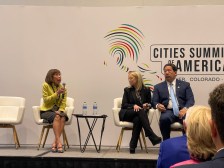IBM expands Smarter Cities Challenge
IBM will continue its Smarter Cities Challenge grants competition into 2014 and is encouraging regional governing bodies — not just cities — to apply for the company’s pro bono consulting services.
Started in 2011 to coincide with the company’s 100th anniversary, the Smarter Cities Challenge provided 100 cities worldwide with three weeks’ worth of intense consulting to target key challenges in areas such as economic development, water, energy and environment, health and social services, transportation and public safety.
“Effective service delivery in cities requires collaboration of so many stakeholders,” said Stanley Litow, IBM vice president of corporate citizenship and corporate affairs, and president of IBM’s Foundation. “One of IBM’S goals with Smarter Cities Challenge is to help city leaders gather data and organize a community around a shared set of facts. This is so that in spite of budgetary constraints that are so widespread, real progress can be made.”
The winning municipalities spend three weeks with a team of six IBM consultants, gathering and analyzing all available data, then meeting in person with dozens of members of the government, citizen, business, and nonprofit communities. In doing so, they gather diverse perspectives about the causes and potential solutions to the challenge at hand.
At the end of engagements, IBM presents comprehensive recommendations for solving the problem, followed weeks later by a more detailed, written implementation plan. Included in the plan are examples of how other cities have successfully addressed similar issues.
For the 2014 cycle, the Smarter Cities Challenge is open to local and regional, general purpose governing bodies, including cities, counties, prefectures, boroughs and districts.
Jennifer Crozier, IBM’s vice president of global citizenship initiatives, and whose team directs the Smarter Cities Challenge, said: “We believe that our program can be an especially valuable resource to new mayors, with whom we can share successful strategies that have been put into place elsewhere. We’re humbled by the reception this program has enjoyed all over the world these past three years, and we’re pleased that we can continue Smarter Cities Challenge for 2014.”
Past grant recipients have implemented IBM’s Smarter Cities Challenge recommendations. For example:
- Cheongju, Korea invested $2.7 million to redesign bus routes, and won the national Minister’s Citation of Public Administration and Security.
- Da Nang, Vietnam and the Delhi-Mumbai Industrial Corridor are improving the coordination and timeliness of multiple municipal agencies as they manage complex events and projects.
- Eindhoven, Netherlands has reduced crime with strategies that include citizens’ use of social media.
- Edmonton, Canada has improved road safety.
- Glasgow, United Kingdom announced a new £1 million fuel subsidy to provide affordable warmth to low-income elderly citizens. The city also won a £24 million grant from the Technology Strategy Board.
- Jacksonville, Fla., has hired an economic development officer and passed legislation that streamlines city council processes for economic development.
- Ottawa, Canada is developing the neighborhoods near its light rail system by giving incentives to developers and streamlining the permit process.
- St. Louis created a chief performance officer for public safety; better information about criminals is provided to judges; and voters returned control of the police department to the mayor.
- Syracuse, N.Y., created one of New York State’s first land banks, enabling the city to reclaim nearly 4,000 vacant properties and re-purpose them in ways that revitalize neighborhoods and restore the tax base by as much as $11 million over eight years.
- Townsville, Australia earned the prestigious National Smart Infrastructure Award for the IBM/Townsville Smart Water Pilot currently underway to reduce water consumption.
- Tshwane, South Africa launched a project where citizens can report water leaks via text. The data will be used to map their water distribution network.






